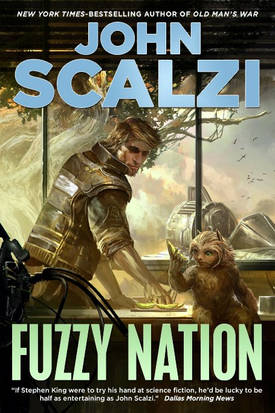
Last year, John Scalzi announced that he’d been commissioned by the estate of H Beam Piper to write an updated version of the classic sf novel Little Fuzzy. I’m very fond of this novel (here’s my review of last year’s award-winning audiobook adaptation), not least because it was the first sf novel I bought with my own money, from the used section of Bakka Books in Toronto (I was nine, and Tanya Huff was working behind the counter; she listened seriously to my enraptured discussion of the Asimovs and Heinleins I’d read from my Dad’s shelves and went and got me the Piper. I never looked back).
Scalzi’s novel, Fuzzy Nation, came out last week and I read it over the weekend. I went to it cold, not sure if it was a sequel or what. There were two Fuzzy novels for some time (Piper having committed suicide before writing a third). Then there was a third volume written by another writer, and then, years later, they recovered a lost Piper manuscript for his own third book, making the whole sequence a little confused.
It turns out that Scalzi and the Piper estate have swept the slate clean with Fuzzy Nation — this isn’t a sequel, prequel, or retelling. It’s a new novel that reboots the Little Fuzzy story, writing it from a thoroughly modern place that takes account of our present-day consensus on the future. For all that Scalzi completely rewrites Piper’s story (only a few characters survive, and several of them undergo personality, gender, and professional reassignments), he is remarkably true to Piper’s original appeal — like Little Fuzzy, Fuzzy Nation is a story about good people trapped in a big organization, and how some of them choose to go along to get along and some of them buck the system, and what it all means for a race of “primitive” sentient beings who’ve just made potentially disastrous first contact with the human race.
In Fuzzy Nation, Jack Holloway is an independent contractor working as a mining surveyor on a distant world, trying to recover valuable geological oddities called sunstones. After inadvertently blowing up a cliffside (and triggering harsh environmental penalties for the company that has the exclusive license to mine the planet), he is fired. A few minutes later, he shows the company rep the massive lode of sunstones he’s just uncovered, and he is quickly recontracted, with a handsome bonus, much to the company man’s humiliation. Jack — a disbarred lawyer and misanthrope who lives with his dog in the middle of the jungle — is feeling pretty good about this when he gets back to his isolated cabin and discovers a kind of large, bipedal cat in his cabin. His dog goes crazy, and he puts it outside, and discovers that his visitor is smarter than any cat he’s ever met — smart enough to befriend the dog when he’s allowed back in.
Here begins the two entwined struggles in Jack’s life: first, the struggle to hold onto his claim (which turns out the be one of the biggest in the history of interplanetary exploration) in the face of the rapacious, authoritarian company that runs the planet; second, the struggle over the destiny of the Fuzzys, who, if sentient, will trigger an evacuation of the planet and a cancellation of Jack’s claim a staggering fortune.
Told in Scalzi’s trademark snappy, sarcastic style, Fuzzy Nation is an absolute delight, full of great set-pieces in which the clever and bright outmaneuver the crass industry barons, thuggish private security muscle, and an entire ediface of interplanetary law that is pretty ambivalent about the role of sentient aliens in the universe. Jack (and his frenemies, like his ex-girlfriend who happens to be the company’s on-planet xenobiologist; and her new boyfriend, who is the company’s chief counsel on-planet) run one caper after another, generally one step ahead of the bad guys, except when they aren’t, and even though you know they’re going to get out of it — this is a book with “happy ending” written all over it from page one — you’re never sure how.
Scalzi’s version of Jack Halloway is an interplanentary, futuristic Travis McGee: a likable, quick-thinking, brawling lunk whose cynicism can’t quite triumph over his internal goodness. Add to that the insanely cute Fuzzys (Scalzi’s deep affection for critters is on full display here) and a real affection for Piper’s original material, and you’ve got a book that can’t miss. This is a perfect swinging-in-the-hammock, summer-weekend novel — and the perfect novel to give to a clever young person of your acquaintance to spark a lifelong love affair with science fiction and all it has to say about how we treat one another, how we treat the rest of the universe, and what we do when the circumstances offer us the chance to sell out our integrity for fortune.
Scalzi is on tour with Fuzzy Nation right now, with upcoming stops in Portland (tonight!), Seattle, Salt Lake City, Scottsdale and Washington, DC.
Update: John Scalzi clarifies: “One small point of fact: I wasn’t commissioned by the Piper Estate to write the novel; I actually wrote it for myself, as (more or less) fan fiction and for fun. And in fact I wasn’t even originally planning to sell it. But when I showed it to my agent he asked if he could talk to the Piper estate about it (it’s now administered by Penguin) and he asked them to read it and if they liked it to give us their blessing and endorsement. Which they did. ”